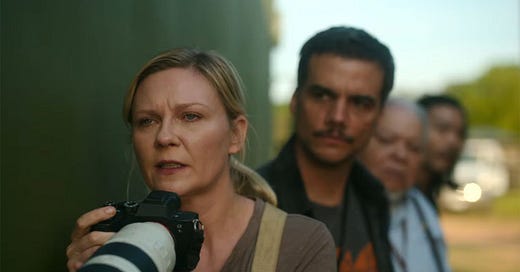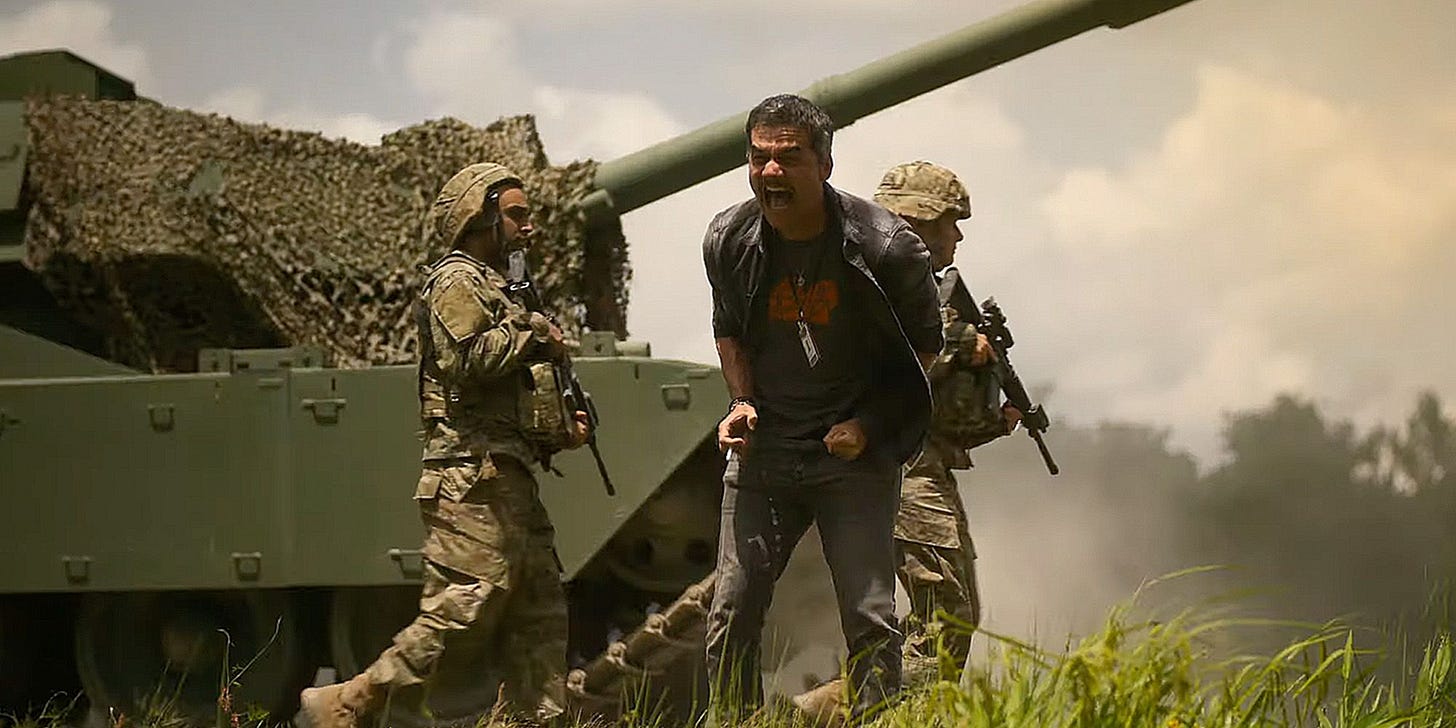Before I start, a small acknowledgement that today is ANZAC Day in Australia and New Zealand. The following piece of writing is complimentary of a film about war - but the reality of war is horrifying. For me, today is to remember those who have given their lives defending our country. But as a self-proclaimed pacifist, its also a reminder of the futility, no matter how necessary, of war.
I finally managed to get along to the last cinema near me still playing Civil War at a reasonable time and see the latest film from British writer and director Alex Garland; the sci-fi specialist is a favourite of mine, from his early writing work on 28 Days Later and Sunshine, to his writing-directing on series Devs and folk horror Men (not to mention his adaptation of Jeff Vandermeer’s Annihilation).
And as I usually do after I see a movie, I went back to check out what other people thought of it. I have a friend who avoids all media ahead of any new Star Wars production - interviews, trailers, reviews, everything. I’m not that strict, but I do try to avoid reviews, especially on Rotten Tomatoes.
Ironically enough, Rotten Tomatoes is usually my first stop after a movie, to get a sense of what the consensus is among critics. Imagine my surprise when I logged on to find that they had apparently seen a different movie to me.
“The film is a kind of advertisement for itself,” says The New Yorker’s Richard Brody. “A fascinatingly empty meditation on journalism and our political divides,” says New Republic’s Osita Nwanevu. “When the fire created by Civil War goes out, it’s easy to feel you’ve been manipulated. Like a house was burned down to the ground just to provoke a reaction. Nothing more,” says Dwight Brown from DwightBrownInk.com.
The quote that surprised me most came from Time’s Stephanie Zacharek:
“But it’s also sodden with its own importance, as if it thinks it’s saying something truly important -- something we don’t already know -- about the real America.”
Here is the thing though:
I don’t think it is about the “real America”.
[Spoilers for Civil War follow.]
Okay, there are some parallels. Nick Offerman’s President is, at least on the surface, a little Trump-ish. There are mentions of trigger words like “Antifa”. And there are plenty of gun-crazy folks hanging out in the middle of nowhere.
But I got the sense that Garland - who, by the way, is British - was going out of his way to make sure it wasn’t being overtly political in such an obtuse way. Aside from the fact that he referred to it super-broadly as an allegory for humanity’s “polarised predicament”, my main reason for thinking so? The invading army is called the Western Forces, a coalition between the liberal state of California and the conservative state of Texas (not to be confused with the Western Force, the Perth-based Super Rugby team).
My feeling is that Garland purposely made the war at the centre of the film make no sense because it wasn’t meant to be the centre of the film. I felt that Civil War was a kind of love letter to photo journalism - especially war journalism, the last bastion of real life spectacle - set to the provocative imagery of scenes usually beamed in from Palestine or Ukraine taking place on the streets of DC, cut together like a series of vignettes, a sequence of photographs. Garland knows a thing or two about visual spectacle; war photography is spectacle by definition
In fact, if he was trying to make any kind of statement, it could probably be summed up by a quote from Lee Smith (Kirsten Dunst) early in the movie:
"Every time I survived a war zone and sent a picture back, I thought I was sending a warning home: don't do this. Yet here we are.”
Garland has sent home pictures of the dangers of AI in Ex Machina, yet we continue developing AI further and more dangerously. Pictures of Big Tech allowed to run rampant in Devs, yet we don’t curb companies like Meta or Google. Pictures of toxic masculinity in Men, yet (gestures broadly).
And now, having admitted this is his last time in the directors chair, Garland has sent one last batch of photos home.
Don’t do this.
I would also add that Alex Garland doesn’t miss.
By my count, this is his ninth winning production in a row out of nine attempts, starting back in 2002 with his screenplay for the utterly brilliant zombie movie (and Cillian Murphy breakout role) 28 Days Later.
Visually, Civil War is an absolute treat. There is something oddly exciting about seeing war on the streets of the United States of America. The cast - led by the brilliant Dunst, ably supported by Wagner Moura and Cailee Spaeny - bounce from a rebel raid to a refugee camp to a sniper battle to a war crime to the city of Washington DC, and each scene is depicted in such detail, filmed so carefully and so beautifully, that it is truly astounding.
But I suspect it hits differently for people outside America than it does for people inside. Its possible (maybe even likely) my reading of the film is wrong, that it is as political as American critics seem to think it is. But I also think its unhelpful to label anything set in the world of politics a political statement. A movie can be set in a world without being about that world. Sometimes your big budget ring-based fantasy trilogy is just a story about friendship. Sometimes your war movie is just about people taking photos.
Maybe the concerning thing here is that American politics is in such a state of confusion that critics there can’t tell the difference any more.
Five Songs Worth Checking Out!
Civil War Needle-Drops Edition
> Silver Apples - “Lovefingers”
One of the earliest needle-drops in the movie is from this little-known electronic duo from New York, the setting of the opening scenes.
> De La Soul - “Say No Go”
I loved 3 Feet High And Rising when I revisited it earlier this year; this is one of its best tracks and juxtaposes nicely with the visuals of the scene it features in.
> Suicide - “Dream Baby Dream”
I’d only heard Bruce Springsteen’s version before so was pleasantly surprised to hear this original version (produced by The Cars’ Ric Ocasek) over the credits.
> Skid Row - “Sweet Little Sister”
The biggest moment for Skid Row since sometime before 1990.
> Sturgill Simpson - “Breakers Roar”
The country singers’ ballad underpins one of the most beautiful sequences in the film perfectly; a gorgeous song used in exactly the right moment.
Hey everybody, thanks for reading this rushed out review of Civil War. I thoroughly enjoyed the movie. Way more than I enjoyed Ghostbusters: Frozen Empire last week. Ugh.
Take care of yourselves,
Chris







Civil War was fully appreciated by me and the two people I watched it with (including an American). We were all pretty floored by it - and spent a good half hour after in discussion.
It really stuck with me for quite a few days, will definitely be something I rewatch.
It is what it is. Big dumb fun nothing more.